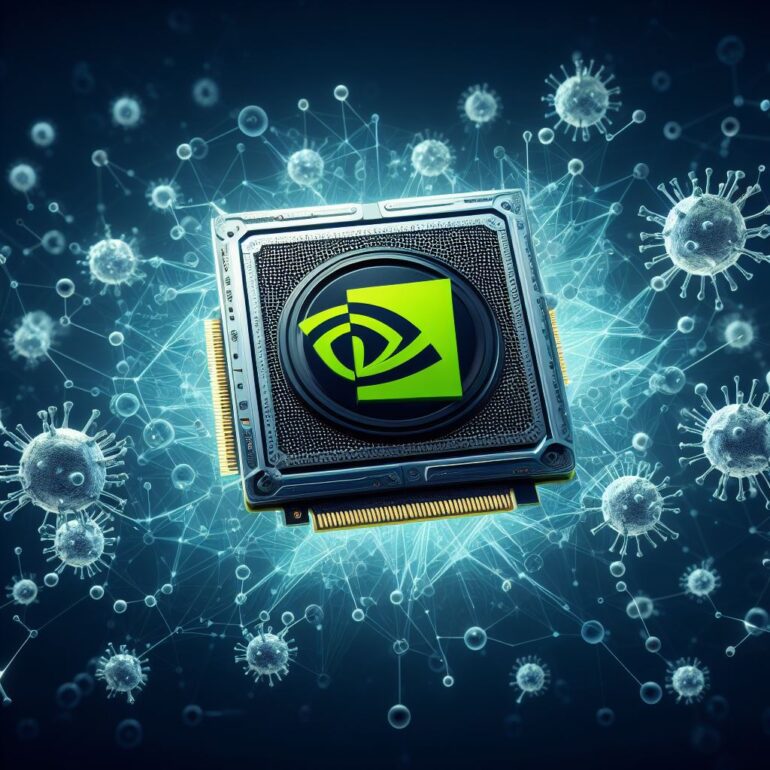TL;DR:
- Nvidia’s GenSLMs AI model generates gene sequences resembling COVID-19, developed in partnership with leading academics.
- GenSLMs effectively predict virus mutations despite training only on late 2019 genomes.
- The AI model distinguishes COVID-19 variants and visualizes evolutionary patterns in the genome.
- GenSLMs received recognition with the Gordon Bell special prize at the SC22 supercomputing conference.
- Nvidia introduces advanced AI chips with larger memory and faster speeds.
- Google and Meta also explore AI in medical research for breast cancer detection and communication assistance.
- Critics express concerns about AI’s impact on the global economy across various sectors.
Main AI News:
In a groundbreaking move, chip manufacturer Nvidia has unleashed the power of artificial intelligence (AI) to enhance medical research focused on predicting the behaviors of COVID-19 variants. The GenSLMs model, unveiled in a recent blog post, stands at the forefront of this innovation, as it possesses the capability to generate gene sequences closely resembling the genetic makeup of SARS-CoV-2, the virus responsible for COVID-19.
Developed in collaboration with esteemed academics from the Argonne National Laboratory and the University of Chicago, the GenSLMs model, a large language model (LLM), underwent extensive training using a vast dataset containing nucleotide sequences, which serve as the fundamental building blocks of DNA. What sets this AI model apart is its unique proficiency in discerning the distinctions between various COVID-19 variants and categorizing genome sequences.
The researchers behind GenSLMs reported that the model exhibited remarkable competence in producing sequences that closely resembled the COVID-19 strains prevalent in 2023. Astonishingly, this AI marvel was trained solely on genomes from late 2019, making its ability to predict virus mutations a remarkable achievement.
GenSLMs lead researcher, Arvind Ramanathan, commented on the model’s remarkable capabilities, stating, “Our model’s generative process is extremely naive, lacking any specific information or constraints around what a new COVID variant should look like. The AI’s ability to predict the kinds of gene mutations present in recent COVID strains—despite having only seen the Alpha and Beta variants during training—is a strong validation of its capabilities.”
Beyond its predictive prowess, Nvidia’s GenSLMs model excels at differentiating between COVID-19 variants and deciphering long sequences of nucleotides. Leveraging advanced software, researchers can visualize the evolutionary patterns of proteins within the COVID-19 genome, opening up exciting new avenues for medical research.
Ramanathan further elaborated on the model’s potential impact, saying, “Looking at the model’s understanding of which mutations are particularly strong in a variant may help scientists with downstream tasks like determining how a specific strain can evade the human immune system.“
The accolades for GenSLMs have already started pouring in, with the research team garnering the prestigious Gordon Bell special prize at the 2022 SC22 supercomputing conference. The LLM relies on Nvidia A100 Tensor Core supercomputers, Selen, and the U.S. Energy Department Perlmutter for its training, endowing it with advanced capabilities that are pushing the boundaries of AI in medical research.
Notably, Nvidia has recently introduced a new range of AI chips boasting larger memory capacities, faster processing speeds, and seamless compatibility with previous chipsets, further solidifying its position as an AI technology leader.
The Intersection of AI and Medical Research
The application of AI in medical research has gained significant momentum, with major tech companies actively developing tools to aid researchers in their endeavors. For instance, Google joined forces with iCAD to create an AI-based tool aimed at enhancing breast cancer detection. This innovative tool has the potential to reduce false positives and unnecessary recalls, revolutionizing breast cancer screening.
Meta (NASDAQ: META) is also making strides in the realm of AI, leveraging it to generate images by analyzing brain activity. Although this project is still in its nascent stages, Meta is confident that it will provide a groundbreaking means of communication for individuals with disabilities using AI-generated images.
Despite the immense benefits that AI brings to the field of medicine, it is not without its critics. Some argue that AI poses significant threats to various sectors of the global economy, including finance, Web3, education, media, and security. As the debate surrounding the role of AI in society continues, its potential to transform and revolutionize various industries remains undeniable.
Conclusion:
Nvidia’s GenSLMs AI breakthrough in COVID-19 variant prediction showcases remarkable potential for revolutionizing medical research. This innovation positions Nvidia as a leader in the field and underscores the transformative power of AI in healthcare. As large tech companies like Google and Meta also venture into AI-driven medical research, the market can anticipate continued advancements with the potential to reshape healthcare diagnostics and communication solutions. However, it is essential to address the concerns raised by critics regarding AI’s broader economic impact.

